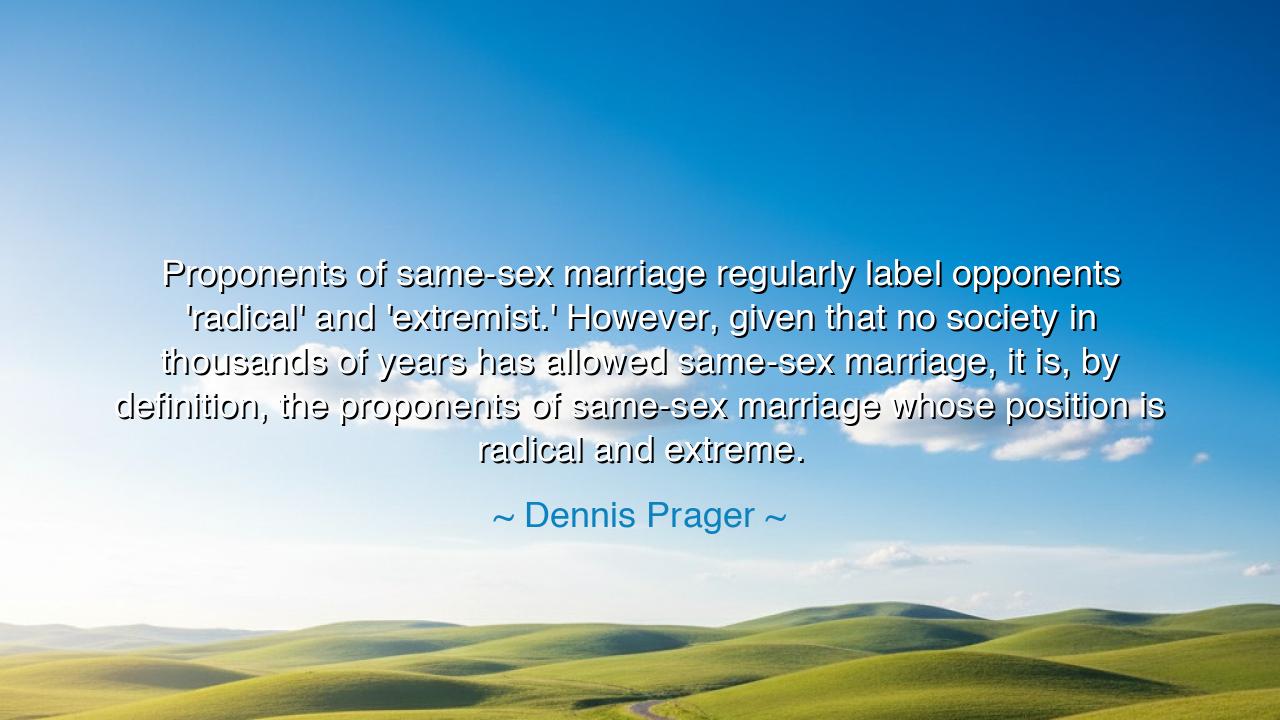
Proponents of same-sex marriage regularly label opponents
Proponents of same-sex marriage regularly label opponents 'radical' and 'extremist.' However, given that no society in thousands of years has allowed same-sex marriage, it is, by definition, the proponents of same-sex marriage whose position is radical and extreme.






When Dennis Prager declared, “Proponents of same-sex marriage regularly label opponents 'radical' and 'extremist.' However, given that no society in thousands of years has allowed same-sex marriage, it is, by definition, the proponents of same-sex marriage whose position is radical and extreme,” he sought to frame the great cultural conflict of our age not as a matter of emotion or passion, but as one of history and tradition. His words are a defense of the ancient order, a reminder that for millennia, marriage has been defined as the union of man and woman, the cornerstone of family and civilization. To alter this definition, he argues, is not a preservation of tradition but a bold departure from it.
The meaning of this quote lies in the way it reclaims the language of accusation. To be called radical or extreme is often a mark of shame, suggesting that one’s position is dangerous or unstable. Yet Prager turns this charge around: if stability is measured by history, and if wisdom is measured by the endurance of custom, then the radicalism lies not with those who defend marriage as it has been, but with those who seek to redefine it against the record of civilizations stretching back thousands of years. Thus, he teaches that labels must be examined in the light of history, not merely hurled as weapons of rhetoric.
The origin of his argument is rooted in the cultural debates of the late twentieth and early twenty-first centuries, when societies in the West began to consider—and later to legalize—same-sex marriage. For advocates, this was a triumph of equality, a long-delayed recognition of love and dignity for all. For opponents such as Prager, however, it was a revolution, a breaking away from an institution that had survived unchanged through empires, religions, and ages. His words must be understood not as a dismissal of compassion, but as a warning that to change such a fundamental pillar of civilization is to embark on an experiment untested in human history.
History provides us with examples of how radical departures from custom can shake societies. Consider the French Revolution, which sought not only to overthrow monarchy but to reorder the very fabric of society—time, religion, and family life. At first it seemed like a triumph of liberation, yet its radicalism soon dissolved into violence and chaos. Whether or not one agrees with Prager, his argument rests on the lesson of history: that traditions enduring for millennia often hold hidden wisdom, and to discard them suddenly is to risk consequences unseen.
The wisdom in his words is that labels must not blind us. Radical and extreme are not insults in themselves, but descriptions of distance from tradition. Sometimes, as in the case of slavery’s abolition, to be radical is to be righteous. At other times, radical shifts bring turmoil and regret. Prager calls us to weigh change not merely by emotion, but by careful reflection: is this change an advancement of justice, or a severing of roots that once nourished society? His words do not resolve the question, but they challenge us to face it with sobriety.
The lesson here is that in matters of great consequence, we must never be swept away by rhetoric alone. We must examine history, tradition, and the wisdom of the ages before branding others as enemies. Even when we disagree, let us do so with clarity, understanding what is being preserved and what is being challenged. If change is to come, let it come with humility, aware that we are reshaping not only laws but the very patterns of human life that have guided countless generations.
What then must the listener do? Consider carefully the weight of words such as radical and extreme. Do not wield them as weapons without thought, but ask yourself: what is the history of this idea? What is the foundation of this custom? And if I seek to change it, do I understand the magnitude of the step I take? Whether you stand with tradition or with reform, approach the matter with reverence, not haste. For in marriage, as in all sacred institutions, we are not only shaping our own lives, but those of generations yet unborn.
Remember always: marriage has been the bedrock of human civilization for millennia, and any attempt to redefine it must be seen as radical in the truest sense of the word. Whether one embraces or resists this radicalism is a matter of conscience, but wisdom demands that we recognize the weight of the change. Let future generations learn from our debates, and let them see not only passion and conflict, but also careful reflection, humility, and the courage to question both tradition and reform with equal honesty.






AAdministratorAdministrator
Welcome, honored guests. Please leave a comment, we will respond soon